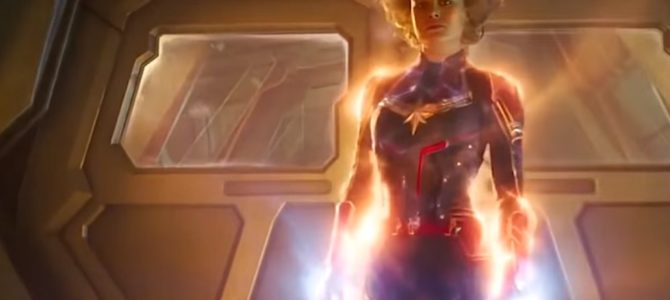
After the massive success of its first wave of movies culminating with the epic “Avengers: Endgame,” Marvel has announced its second generation of movies for the many fans not ready to leave the Marvel Cinematic Universe. While some of the surviving Avengers will continue to appear together, the popular superhero Spider-Man will sadly be on his own due to Disney’s greed.
What drew the most attention with the new lineup of MCU movies, however, was its expansion of identity politics. “The Eternals” will feature the first openly gay character; the Thor movies will now feature a female protagonist, Lady Thor; and, to top off the intersectional pyramid, the spinoff character Valkyrie from “Thor: Ragnarok” will be a bisexual black woman. The final Avengers movie hinted at much of this development, when it opened with Captain America comforting a gay man discussing his dating struggles and concluded with a tableau of female superheroes leading the fight against Thanos.
Obviously, this announcement is calculated to trigger some buzz — good and bad — about the upcoming movies and partake in the current zeitgeist. Whatever the reaction may be, however, fans can predict with near certainty that the hubbub over these decisions will likely be more interesting than the movies themselves.
Just as it has killed comedies, political correctness now threatens to kill superhero movies — not exactly in box office sales, but in terms of quality entertainment. While there is a healthy push to feature every variation of race, sex, and sexuality in prominent roles, there is also a harmful push to remove every flaw and potential stereotype associated with such a person.
It is not enough to cast someone different for the main role (which, again, is a good thing); the character that person plays must be above reproach in all regards — in other words, they must be boring. A quick review of the recent blockbuster action movies (all owned by Disney) attests to this unpleasant truth.
Political Correctness Creates Boring Heroines
A female protagonist must now be far more powerful than the other characters, including the villain. She cannot show weakness; this would be sexist. Therefore, in movies such as “Captain Marvel,” “Wonder Woman,” the new “Star Wars” films, and even the new “Men in Black” sequel, the heroine vastly outshines anyone around her, to the point of hardly ever struggling. The Disney princess movies have also followed this trend to a lesser degree.
While this may signal female empowerment, it deflates the plot and characters. What exactly is the conflict for any of these women who clearly have nothing to challenge them? Inevitably, the conflict becomes themselves. These heroines need to overcome their insecurity and humility and just dominate. Once Captain Marvel, Wonder Woman, and Rey finally learn to trust themselves and stop listening to others, they win the battle handily.
And they must do it alone. Relationships, particularly romantic ones, are superfluous for the female superhero. Captain Marvel — who may be the queen Valkyrie is looking for — has no love interests. The most she does with her similarly attractive and powerful male mentor (played by Jude Law) is fight him.
Rey is the same; she either fights men or asks them to hold her beer while she fights other men. Wonder Woman seems to have feelings for Chris Pine’s character, but for much of the movie, they are brothers in arms. The Disney princesses also share this attitude about men, where they either ditch the idea of a romantic partner (Prince Charming is the epitome of the patriarchy) or treat it like a forgettable afterthought. Love stories are apparently for the weak.
Audiences understandably feel little connection with these heroines. Fans, both men and women, are eager to cheer them on, but they find this difficult when the snowman shows more warmth, the failed storm trooper shows more courage, and Samuel L. Jackson shows more gentleness.
Even if supernatural power makes a woman the hero, she needs to have flaws to make her human. The same rule applies to men, which is why Superman will always disappoint audiences, while Batman mostly succeeds.
Political Correctness Ruins Diversity of Personalities
Action movies with nonwhite heroes often run into a different kind of problem, but for the same reason of keeping politically correct. Whereas being female removes all potential flaws, being nonwhite often removes any distinctive personality.
With the lone exception of Nick Fury (played by Samuel L. Jackson), expressing one’s racial identity seems to be considered racist. Thus, the black sidekicks of Ironman and Captain America, War Machine and Falcon, do little more than act as foils for the two white heroes who lead. The same goes for Valkyrie and Heimdall in the “Thor” movies and Maria Rambeau in “Captain America.”
Even when the main protagonist is black, this problem of whitewashing still appears. There is nothing particularly unique about Black Panther, who simply fights the villain because it’s the right thing to do. His race adds nothing to his character. Whatever efforts the creators made in reproducing and celebrating African traditions, he and the other Wakandans practically have more in common with the Vulcans and Klingons from “Star Trek” than any person in a modern diverse society. Wakanda is a societal version of the female superheroes: It has no flaws, is incredibly powerful, and does not need anyone else for anything.
By contrast, race does play a part in Black Panther’s nemesis, Killmonger. He experiences adversity by growing up on the streets of Oakland (a real place, not a sci-fi utopia) and being denied his patrimony, which fuels his desire to escape this situation and take control. He is relatable and admirable for making it as far as he did and not settling for victimhood. But he is nevertheless the villain who goes mad with power, plans world conquest, and falls to Black Panther. Order is restored, but an interesting character and a relevant argument about the black experience are lost.
Fans Are Ready for an Interesting Superhero
Fans have few reasons to hope Hollywood will approach its new movies any differently. A politically correct culture that preaches celebrating diversity while handling that same diversity with kid gloves leaves two options for filmmakers: (1) They can treat it superficially and include in peripheral roles minorities who act no differently than the white male characters in the foreground, which is what they have done with most of the movies thus far, or (2) they can place minorities at the center of their films and either make their characters virtually flawless or indistinguishable from a white male superhero, and compensate for subsequent blandness with abundant special effects and an attractive cast.
More than likely, Marvel will take the second option for its fresh new characters, who more resemble inoffensive political figures than people with real problems. Its gay character in “The Eternals” already sounds like a superpowered Pete Buttigieg. According to the Marvel Studios president, “He’s married, he’s got a family, and [his homosexuality] is just part of who he is.” Valkyrie will probably resemble a superpowered Michelle Obama, who will happen to have a high-powered wife instead of a high-powered husband.
Fans can only hope that once the novelty wears off, producers will explore a third way of having diversity in their movies and finally ignore the pressures of political correctness altogether. That would mean allowing women, LGBT people, and nonwhite people to be realistic human beings. This does not mean exploiting stereotypes like the “Rush Hour” movies (which almost certainly would not be made in today’s cultural climate), but crafting characters and narratives that make the minority protagonists natural and relatable, like “Spider-Man: Into the Spider-Verse.”
Not only would taking a more authentic approach to diversity make the movies more interesting and fun to watch, it would also go further in eliminating negative stereotypes and erasing boundaries between different groups. Empty movies that mean only to virtue signal leave people wondering if it’s possible to create a quality movie with minority leads. It is possible, and audiences are ready for it.









